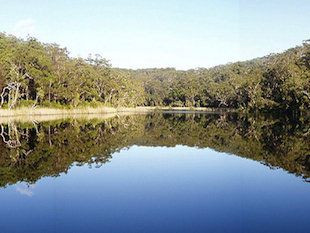Australian Scientists Discover God's Bathtub: 7,500-Year-Old Chemically Untouched Lake

Here's to hoping we never find God's toilet: a team of scientists has discovered a pristine lake they say has remained in the same chemical state for over 7,000 years.
They're calling the lake "God's bathtub."
"It is beautiful," Dr. Cameron Barr, Ph.D., from The University of Adelaide, told the Australian Associated Press. "It is absolutely beautiful."
The lake, which sits tucked away on North Stradbroke Island, off the south Queensland coast in Australia, is one of the largest around and has been recently named Blue Lake.
The water in the lake is so clear you can see more than 30 feet below the surface, straight to the bottom.
Every 35 days or so, the water in the lake drains to a swamp and is replenished with the help of an aquifer - a layer of permeable, porous rock beneath the ground's surface that functions as a natural filter.
Barr and his team of researchers from the University of Adelaide said Blue Lake is the only known lake of its kind in Australia.
"Australian freshwater ecosystems, by their nature and by the nature of the climate which affects them, are variable," Barr said. "This place seems to be quite unique in that it shows such an amount of stability. So in that sense it's a refuge for freshwater biota away from those variable environments."
Barr's team members studied the lake's water quality, fossil pollen, and water algae. They also looked at diatoms, a major group of algae whose physical makeup enables scientists to study water quality.
"Diatoms are very, very susceptible to changes in water chemistry," Barr said. "What we've found by looking at these diatoms, how they changed over time, is that there was very little change in the chemistry of the lake over the last 7,500 years."
The team then compared the lake to photographs of surrounding lakes from the last 117 years, which, surprisingly, they had intended on studying before stumbling upon Blue Lake by accident.
In the past 40 years, several lakes in the surrounding area have dried up, Barr noted. Climate change has impacted them in ways to which Blue Lake has stayed immune.
"Because it's constantly being updated it doesn't suffer from the vagaries of the climate in so far as it doesn't evaporate and become more saline," Barr told the Australian Broadcasting Corporation. "It doesn't fill up and become fresher. It just remains constant."
Barr added that something as small as a drop of a tourist's sunscreen could alter the lake's chemistry. (No word yet on bubble bath.)
Published by Medicaldaily.com



























